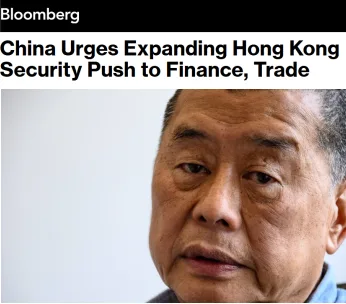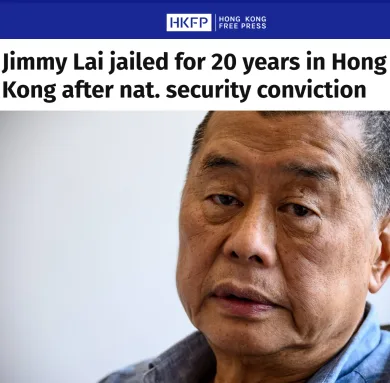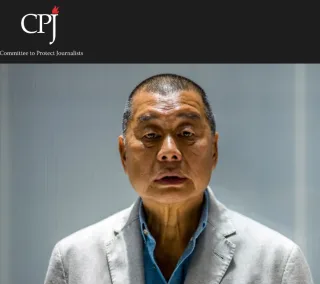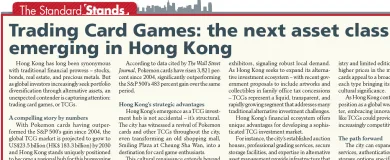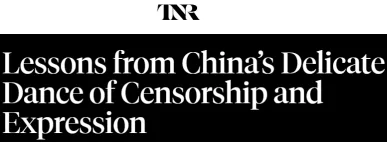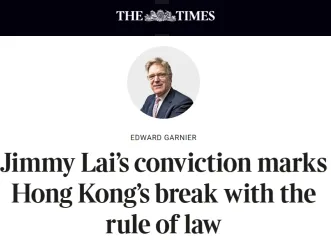Jimmy Lai, age 78, gets 20 years for conspiracy to collude with foreign forces and printing seditious materials. He had been held without bail since end-2020, denied access to his choice of legal counsel, and tried by handpicked national security judges with no jury.
Beijing has detested Lai since at least 1994, when he called Li Peng a ‘son of a turtle’s egg’.
The Collective on the scene outside the court beforehand…
For days, observers had been sleeping in the open while waiting in line. Around 4 a.m., most of those queuing were still asleep. Police tightened restrictions on their movement; anyone needing to leave to use the restroom was searched. A woman who had been queuing outside the West Kowloon Magistrates’ Courts last Thursday evening was told by officers that she had an Apple Daily keychain on her person … About ten officers then removed the barricades, escorted her into the queuing area, confiscated all her bedding and belongings, and took her to Cheung Sha Wan Police Station for investigation.
HKFP report…
Publisher Cheung Kim-hung received six years and nine months behind bars, associate publisher Chan Pui-man got seven years, and editorial writer Yeung Ching-kee was sentenced to seven years and three months. Meanwhile, editor-in-chief Ryan Law, executive editor-in-chief Lam Man-chung, and editorial writer Fung Wai-kong all received 10-year jail terms.
Kevin Yam says…
By way of comparison, China sentenced leading dissidents Liu Xiaobo to 11 years and Xu Zhiyong to 14 years.
NYT compares Lai’s sentence to those of academic Ilham Tohti, property tycoon Ren Zhiqiang, human rights lawyers and the HK 47…
Jimmy Lai’s 20-year prison sentence, the heaviest penalty handed down for a national security offense in Hong Kong so far, aligns with how the Chinese Communist Party has punished wealthy entrepreneurs and influential academics in the mainland for challenging the state.
Xi Jinping, the most powerful Chinese leader in decades, has waged a far-reaching crackdown on any vestiges of dissent. He has targeted not only human rights activists but also business tycoons, intellectuals and members of the party elite, some of whom have been sentenced to nearly 20 years in prison.
From Luke de Pulford…
Effectively a life sentence for Jimmy Lai.
For peacefully criticising the Chinese government.
Samuel Bickett…
A sentence carefully selected to ensure Jimmy dies in prison and is made an example of locally while avoiding international headlines of a life sentence. Petty, insecure dictatorships have to have their bogeyman.
It also gives the authorities ample time – subject to Jimmy Lai’s health – to use his release as a bargaining chip with other countries if the need arises.
RTHK quotes Chief Executive John Lee…
Lee said the 156 days of open trial hearings – during which large amounts of evidence were offered – showed that Lai was a despicable and shameless anti-China mastermind.
The CE said in a statement Lai “has committed numerous heinous crimes, and his evil deeds were beyond measure.”
“The severe sentence of 20 years’ imprisonment imposed on him manifests that the rule of law is upheld and justice is done, and also brings great relief to all,” he added.
Via HKFP, responses from the DAB, NGOs and others, including Regina Ip…
“[His] acts caused significant harm to the country and to Hong Kong, endangering national security. The court noted that around 2019, Jimmy Lai held activities… locally and abroad. Because he is so influential, the damage was grave. I agree with the court’s decision. Jimmy Lai’s crimes were serious, and his sentence should be no less than 10 years.”
The government issues a statement ‘condemning external forces for slandering and smearing court’s sentencing’…
…the western countries, anti-China media, organisations and politicians have used this as a pretext to slander, smear, and attack the Hong Kong Special Administrative Region (HKSAR). They have even maliciously disparaged the court’s independent judgement and sentence handed down in accordance with the law. The HKSAR Government firmly opposed and strongly condemned such despicable conduct.
…The HKSAR spokesperson stressed, “In Lai Chee-ying’s case, after 156 days of fair and impartial public hearings, the court has considered the irrefutable evidence of up to 2 220 exhibits, over 80 000 pages of documents and statements of evidence from 14 prosecution witnesses. The court pointed out clearly that Lai Chee-ying was the mastermind of the case. He had manipulated and exploited Apple Daily to poison the society, and repeatedly colluded with external forces to beg for sanctions and hostile activities against the Central Authorities and the HKSAR Government. Even after the enactment of the HKNSL, all the defendants continued with their agreement for some time until after they were arrested by the Police. The court clearly pointed out that Lai Chee-ying’s only intent was to seek the downfall of the Communist Party of China even though the ultimate cost was the sacrifice of the interests of the people of China and the HKSAR. Lai Chee-ying has brought harm to our country and Hong Kong; his evil deeds were beyond measure, and he for sure deserves his punishment after all the harm he has done.”
An SCMP editorial says the trial ‘shows Hong Kong’s rule of law remains robust’…
Lai was found to have led plots to instigate sanctions against Hong Kong and mainland China and to have incited public hatred towards the authorities. This was no ordinary case. He was working to bring chaos in a bid to topple China’s government, posing a threat to national security. What he did to Hong Kong was extremely damaging. Deterrent sentences were required.
(Would a reputable newspaper’s fact-checkers be OK with, say, that third sentence?)
The head of Hong Kong Police national security department raises the possibility of an appeal for an increased sentence.
From Reuters…
Lai’s sentence was enhanced by the fact that he was the “mastermind” and driving force behind “persistent” foreign collusion conspiracies, the judges said.
They cited prosecution evidence that the conspiracies had sought sanctions, blockades and other hostile acts from the U.S. and other countries while involving a web of individuals including Apple Daily staff, activists and foreigners.
…”The harsh 20-year sentence against 78-year-old Jimmy Lai is effectively a death sentence,” said Elaine Pearson, Asia director of Human Rights Watch. “A sentence of this magnitude is both cruel and profoundly unjust.”
Hong Kong police swiftly played down concerns about Lai’s health. Chief Superintendent Steve Li of the force’s national security department said Lai’s health concerns had been “exaggerated” and added that the tycoon deserved his sentence.
The judges said they were not inclined to give Lai any deduction for his medical condition, age and solitary confinement but acknowledged he would face a “more burdensome” time than other inmates. They cut a month off the sedition sentence and one year each for the collusion charges.
The Guardian…
Jimmy Lai, the media mogul and prominent pro-democracy activist, has been sentenced to 20 years in prison in Hong Kong for national security offences, a punishment his daughter said could mean “he will die a martyr behind bars”.
Claire Lai said the sentence was “heartbreakingly cruel” given her 78-year-old father’s declining health, while her brother Sebastien Lai called the sentence “draconian” and “devastating”.
The sentencing is the culmination of a years-long saga that critics say represents Hong Kong’s transformation from a mostly free city to one where dissent is fiercely suppressed by the Chinese Communist party-controlled authorities.
…Human Rights Watch said the length of jail time given to Lai was “effectively a death sentence”.
“A sentence of this magnitude is both cruel and profoundly unjust. Lai’s years of persecution show the Chinese government’s determination to crush independent journalism and silence anyone who dares to criticise the Communist party,” the statement said.
Amnesty International called the case “another grim milestone in Hong Kong’s transformation from a city governed by the rule of law to one ruled by fear”.
Background and report from AP…
Urania Chiu, lecturer in law at Oxford Brookes University, said the case is significant for its broad construction of seditious intent and application of the term “collusion with foreign forces” to certain activities by the media. The implication is particularly alarming for journalists and those working in academia, she said.
“Offering and publishing legitimate critiques of the state, which often involves engagement with international platforms and audiences, may now easily be construed as ‘collusion,’” Chiu said.
The UN Commissioner for Human Rights calls for Lai’s release…
Mr. Türk’s office, OHCHR, said it had reviewed the verdict and was concerned that it criminalised the exercise of fundamental freedoms, including freedom of expression, media freedom and association.
It noted that the ruling relied extensively on conduct that occurred before the NSL came into force, reiterating concerns it had previously raised about the broad scope of the offence of “collusion with external forces” under the NSL.
“Jimmy Lai is a publisher sentenced to 20 years in prison for exercising rights protected under international law,” Mr. Türk said.
“This outcome highlights how the vague and overly broad provisions of Hong Kong’s national security legislation can lead to being interpreted and enforced in violation of Hong Kong’s international human rights obligations. This verdict needs to be promptly quashed as incompatible with international law.”
The BBC’s full account of Jimmy Lai’s rise to success and emergence as a critic of the CCP.
China Digital Times on the idea that Lai asked the US to nuke China…
…the misrepresentation of Lai’s remarks is an unremarkable piece of viral political misinformation. It bears a marked resemblance, though, to the campaign to discredit the late Nobel Peace Prize laureate Liu Xiaobo, based on a comment from an interview with Emancipation Monthly editor Jin Zhong on November 27, 1988. Liu is often said to have “advocated” or “prescribed” three centuries under foreign colonization to transform China along the same lines as Hong Kong. In both cases, a punchy quote is taken out of context and used to paint the target as a national traitor willing to see his countrymen enslaved or vaporized by the hostile West.
One last official response: the HK Fires Services Dept uses its Facebook account to express support for the sentence – on grounds of public safety.


